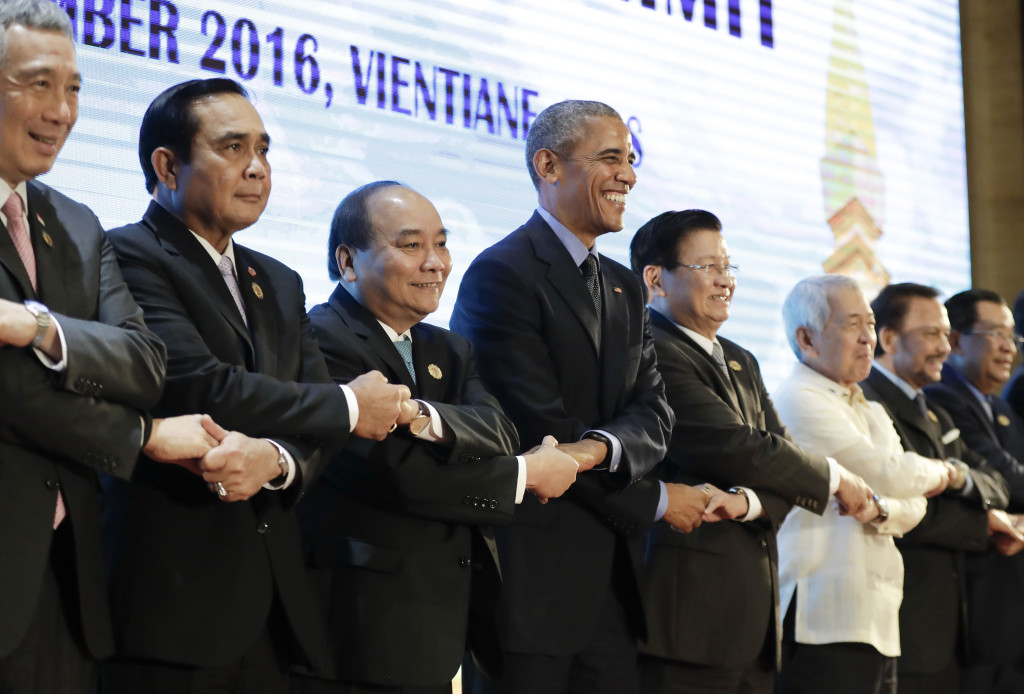
U.S. President Barack Obama, fourth left, poses for a photo before the start of the ASEAN-U.S. Summit Meeting at National Convention Center in Vientiane, Laos, Thursday, Sept. 8, 2016. From left: Singapore’s Prime Minister Lee Hsien Loong, Thailand’s Prime Minister Prayuth Chan-ocha, Vietnam’s Prime Minister Nguyen Xuan Phuc, Obama, Laos’ Prime Minister Thongloun Sisoulith, Philippines Foreign Affairs Secretary Perfecto Yasay, Brunei’s Sultan Hassanal Bolkiah and Cambodia’s Prime Minister Hun Sen. (AP Photo/Carolyn Kaster)
MANILA — American business leaders in the country warned on Thursday about recent developments that could harm the “traditionally excellent bilateral relations between the United States and the Philippines.”
In a statement, the American Chamber of Commerce of the Philippines voiced its growing concerns, particularly over the “language from Philippine leaders” and the treatment of basic American values that Filipinos have long shared. Although statements of regret soon followed, such words and their impact on policy have created investor concern, AmCham said.
The American business group referred to the latest rant from President Duterte in one of his press briefings, when he reportedly called US President Barack Obama a “son of bitch” in local language.
Duterte was responding to a question from a reporter about what he would do if Obama raised the issue of drug-related extrajudicial killings in the country during their bilateral meeting at the Association of Southeast Asian Nations (Asean) in Laos. Duterte’s temper immediately rose and he bluntly declared that as a President of a sovereign nation, he would not be lectured to by the US president about human rights, adding that the Philippines was not a vassal state and no longer a US colony. He warned Obama to be respectful and not just throw “questions” and “statements” about human rights during their meeting, or else, “Son of a bitch, I would curse him right then and there.”
US President Barack Obama walks to his meeting with ASEAN leaders in the ongoing 28th and 29th ASEAN Summits at the National Convention Center, Thursday, Sept. 8, 2016 in Vientiane, Laos. Philippine President Rodrigo Duterte did not attend the meeting and just sent a representative. AP
Philippine President Rodrigo Duterte, center, arrives at the National Convention Center for scheduled bilateral meetings with ASEAN leaders on the sidelines of the 28th and 29th ASEAN Summits and other related summits Tuesday, Sept. 6, 2016 in Vientiane, Laos. He warned US President Barack Obama in advance against raising human rights issues in in their bilateral meeting. Obama cancelled the meeting. (AP Photo/Bullit Marquez)
Over 3,000 have allegedly been killed over the past two months due to President Duterte’s aggressive war on drugs. Some were killed during police operations when the suspects resisted arrest and fired at policemen, triggering a shootout. Some were presumed killed by vigilantes and others were killed by hitmen hired by drug syndicates ensuring nobody would be witnesses against them. Human rights groups said Duterte’s statements encouraging the killings have led to hundreds of murders.
Such developments, according to Amcham, could harm the long-standing optimism of American business to invest in the Philippines.
“While the country’s economic fundamentals are strong and its potential is high, our members have raised concerns that some basic American values – which Filipinos have long shared – may be weakening in the current environment,” the group said.
“Certainly, the illegal drug menace is a serious threat in the Philippines, as it is in the US and elsewhere. However, the increased number of killings during the heightened anti-drug campaign is harming the country’s image, as portrayed by international media, and some investors are now asking whether this campaign reduces the rule of law,” the AmCham further explained.
It added: “AmCham has always been optimistic about the Philippines and committed to strengthen bilateral trade, investment, and cultural ties. We remain hopeful that these ties will become even stronger in the months and years ahead and are committed to working with the Philippine government and people to continually improve them.” SFM/rga
RELATED VIDEOS